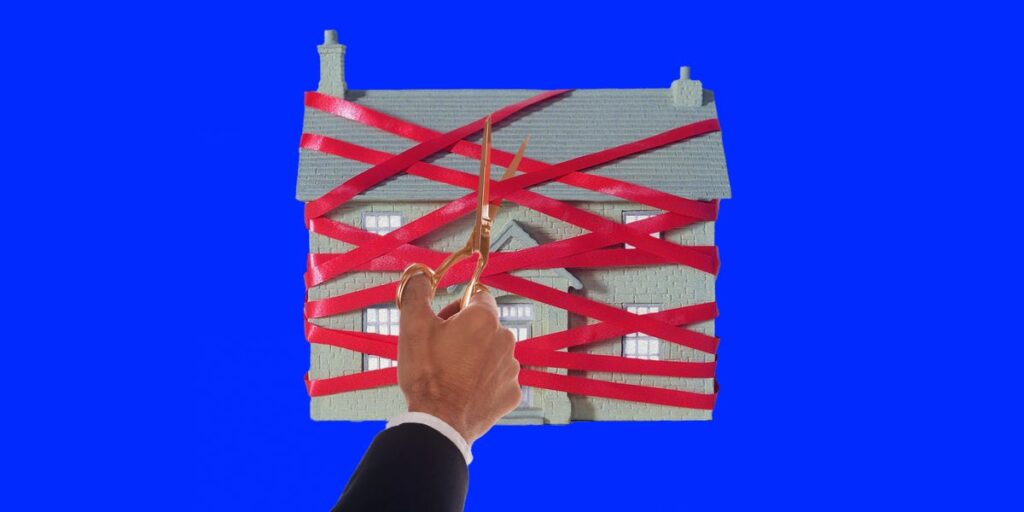- Nevada is facing skyrocketing housing costs.
- Reno Mayor Hillary Schieve says city leaders should cut regulations that stymie construction.
- Federal funding for affordable housing and an emphasis on reducing homelessness is also key.
The mayor of Reno, Nevada, argues that the single best thing city leaders can do to help solve one of the country’s worst housing shortages is to loosen regulations on housing construction.
In recent years, Mayor Hillary Schieve has launched a multi-pronged approach to do just that.
“Sometimes government needs to get out of the way,” she told Business Insider in a recent interview. There’s no quick solution, said Schieve, who isn’t a member of either major party and has made housing and homelessness a top priority.
With the election approaching, Nevada voters cite the economy as among their top concerns. Rising home prices and rents, which have hit the Sunbelt state particularly hard, are a big part of that. Since January 2017, home prices have risen 90% and rents are up 53% in Nevada, far outstripping national growth rates, Alex Horowitz, the director of Pew’s housing-policy project, told Business Insider.
Greasing the wheels for housing
Nevada had one of the highest rates of home foreclosures in the country after the 2008 financial crisis slammed its tourism-reliant economy and burst its severe housing bubble. In the years since, the state has leveraged low taxes and other business-friendly policies to attract major employers like Amazon, Apple, and Tesla. The new jobs have helped attract hundreds of thousands of new residents.
The pandemic and the rise of remote work supercharged that trend. With an influx of new residents, demand for housing — and subsequently its cost — has soared. In Reno, the median price of a single-family home has increased more than 40% since 2019.
As mayor, Schieve has celebrated the new jobs and the growth of arts and culture in Reno and its surroundings. But she’s also concerned with the housing shortage and rising homelessness. When it comes to boosting affordable housing, she pointed to cutting red tape and making building easier, including by loosening zoning laws and burdensome environmental regulations.
Under Schieve, Reno has loosened some of its regulations by allowing for more density, reducing parking requirements, and cutting fees. Since 2019, the city says it has waived $11 million in sewer hookup fees and $700,00 in building permit fees to help bring more than 2,000 units of affordable housing to the market.
Through a program called “1,000 homes in 120 days,” the city deferred sewer and permit fees for five years for market-rate housing construction, which the city says helped create more than 500 new homes between its implementation in late 2019 and earlier this year.
Schieve, the former chairwoman of the US Conference of Mayors, said Reno’s rules regarding affordable housing construction are relatively lenient. However, she argued that some county and state regulations slow down home building, inflating costs and deterring new construction.
She took particular issue with county health department regulations that impose lengthy review processes. “Most developers are borrowing money,” she said. “So time is money.” Schieve’s chief of staff noted that swimming pool construction, including in housing developments and hotels, “takes an incredible amount of time and an incredible amount of money” to get approved by the department.
Reno has also made some progress on emergency and transitional housing. Schieve received national attention for reducing the number of unhoused people living on Reno’s streets by nearly 60% between 2022 and 2023. The reduction was largely due to the construction of a Nevada Cares Campus, an emergency shelter that can house up to 600 people in sleeping pods and a large tent.
Nevada’s housing issues take center stage in the presidential election
President Joe Biden has visited Nevada multiple times to talk about housing, and his administration’s policies have helped bolster the state’s housing efforts.
Schieve called the housing funding Reno received through the 2021 American Rescue Plan a “godsend.” And she praised the Biden administration for being accessible and responsive to her city’s housing needs. “We can pick up the phone and I can call my HUD secretary, I can call someone at the White House,” Schieve said. The acting HUD secretary, Adrianne Todman, has visited Reno twice in the last year.
Former President Donald Trump’s campaign has also emphasized housing issues in Nevada, focusing largely on its proposal to deport millions of immigrants to free up housing. “We’ve got to build more houses and we’ve got to deport the illegal aliens so that American homes go to American citizens,” vice presidential candidate JD Vance told a crowd in Las Vegas in October.
Schieve dismissed this proposal. “We’ve got to be realistic about how we approach housing,” she said. “That’s not going to solve anything.”
There are aspects of housing policy that Trump and Vice President Kamala Harris appear to agree on, including opening up federal land for additional homes. Nevada has become a focus of this particular solution as 85% of the state’s land area is owned by the federal government.
Schieve says the issue of opening up government-owned land is complex. It depends on factors like the cost of new infrastructure, including roads and water hookups, the expansion of services like law enforcement, and environmental concerns. She supports restricting home construction in environmentally fragile areas, including wetlands and flood-prone regions.
In general, she wants to see cities like Reno invest in rebuilding their urban cores and boosting density rather than sprawl.
“There’s still a lot of blight,” she said. “There’s still a lot of work for cities to build up and not out.”
Read the full article here















